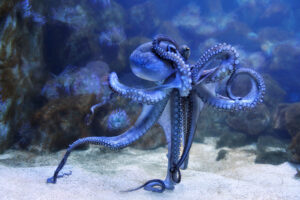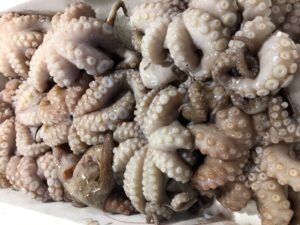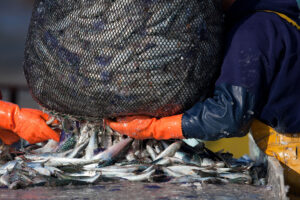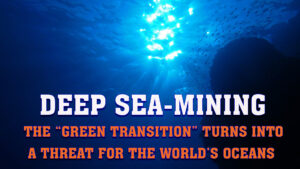The oceans are the cradle of life and the most biodiverse habitat on our planet. Around 23,000 species are known, but scientists estimate that as many as 10 million species could live in the oceans!1)2010 Professor Pedro Martínez, Director of the Senckenberg Research Institute by the Sea (Wilhelmshaven) & https://ocean.si.edu/ecosystems/census-marine-life (In comparison, around 1.4 million species live on land.) Although the Earth is a “water planet”, the depths of the oceans are the least explored regions. We even know more about the moon than about the deep sea…
 One of the fascinating creatures of the deep sea are the octopuses. These very special animals are highly intelligent, about as intelligent as dogs, and this despite the fact that octopuses have no central nerve system and their neurones are distributed all over their entire bodies, of which two thirds are located in the arms.2)https://www.costanachrichten.com/spanien/politik-wirtschaft/oktopus-farm-zucht-gran-canaria-proteste-kritik-spanien-nueva-pescanova-tierquaelerei-92149660.html, https://www.derstandard.de/consent/tcf/story/2000145076845/verblueffende-erkenntnisse-zur-intelligenz-von-tieren-werfen-ethische-fragen-auf ,https://www.nzz.ch/panorama/tod-durch-erfrieren-so-geht-die-massenzucht-von-tintenfischen-ld.1733985?reduced=true, https://www.nationalgeographic.de/tiere/2022/07/weltweit-erste-oktopus-farm-loest-tierschutz-debatte-aus, https://www.peta.de/themen/oktopus/, https://www.theguardian.com/environment/2022/mar/11/my-octopus-eater-critics-say-plans-for-farm-are-unethical-and-unsustainable Octopuses possess considerable cognitive abilities and have short- and long-term memory. They learn by observation, act with foresight, use tools and can distinguish human faces. They are even able to escape from screwtop jars, find their way out of complex mazes and throw mud and shells at their fellow octopuses. This may even show a sense of humour…! More than 300 scientific studies have shown that octopuses are sentient beings capable of feeling pain and pleasure.
One of the fascinating creatures of the deep sea are the octopuses. These very special animals are highly intelligent, about as intelligent as dogs, and this despite the fact that octopuses have no central nerve system and their neurones are distributed all over their entire bodies, of which two thirds are located in the arms.2)https://www.costanachrichten.com/spanien/politik-wirtschaft/oktopus-farm-zucht-gran-canaria-proteste-kritik-spanien-nueva-pescanova-tierquaelerei-92149660.html, https://www.derstandard.de/consent/tcf/story/2000145076845/verblueffende-erkenntnisse-zur-intelligenz-von-tieren-werfen-ethische-fragen-auf ,https://www.nzz.ch/panorama/tod-durch-erfrieren-so-geht-die-massenzucht-von-tintenfischen-ld.1733985?reduced=true, https://www.nationalgeographic.de/tiere/2022/07/weltweit-erste-oktopus-farm-loest-tierschutz-debatte-aus, https://www.peta.de/themen/oktopus/, https://www.theguardian.com/environment/2022/mar/11/my-octopus-eater-critics-say-plans-for-farm-are-unethical-and-unsustainable Octopuses possess considerable cognitive abilities and have short- and long-term memory. They learn by observation, act with foresight, use tools and can distinguish human faces. They are even able to escape from screwtop jars, find their way out of complex mazes and throw mud and shells at their fellow octopuses. This may even show a sense of humour…! More than 300 scientific studies have shown that octopuses are sentient beings capable of feeling pain and pleasure.
In the past, there was such an abundance of octopuses off the coasts of Spain, for example, that they were a poor man’s food. Today they are increasingly becoming a popular and lucrative speciality. The most popular species from the Atlantic cost 17 to 30 euros per kilo on the fish market or in the supermarket. Worldwide, 350,000 tonnes of octopus are currently caught annually, but there is probably also a considerable number of unreported catches.3)https://www.costanachrichten.com/spanien/politik-wirtschaft/oktopus-farm-zucht-gran-canaria-proteste-kritik-spanien-nueva-pescanova-tierquaelerei-92149660.html Like many marine creatures, octopuses suffer from human impacts such as overfishing, pollution of the seas and the progressive loss of their habitat. Their populations are therefore constantly declining, as is already the case for many fish species.
 But instead of fixing the self-made problems and protecting these wonderful animals and their habitat, the trend in this case is unfortunately currently going in the wrong direction. The Nueva Pescanova company wants to open the world’s first octopus farm on Gran Canaria this year. Around 1 million octopuses per year are to be bred there in narrow water tanks and sold primarily in the premium markets of the USA, South Korea and Japan. 4)https://www.costanachrichten.com/spanien/politik-wirtschaft/oktopus-farm-zucht-gran-canaria-proteste-kritik-spanien-nueva-pescanova-tierquaelerei-92149660.html Octopuses behave territorially and are considered to be solitary animals that like to stay in the dark. The planned breeding in permanently lit tanks with 10-15 animals each in just one cubic metre of water is agony for the intelligent marine animals. Particularly cruel is the way the animals are to be killed, namely by throwing them into a pool of minus three degree cold water. Nueva Pescanova claims this is a gentle, painless method, but scientists and animal rights activists around the world vehemently disagree with this.5)https://www.costanachrichten.com/spanien/politik-wirtschaft/oktopus-farm-zucht-gran-canaria-proteste-kritik-spanien-nueva-pescanova-tierquaelerei-92149660.html
But instead of fixing the self-made problems and protecting these wonderful animals and their habitat, the trend in this case is unfortunately currently going in the wrong direction. The Nueva Pescanova company wants to open the world’s first octopus farm on Gran Canaria this year. Around 1 million octopuses per year are to be bred there in narrow water tanks and sold primarily in the premium markets of the USA, South Korea and Japan. 4)https://www.costanachrichten.com/spanien/politik-wirtschaft/oktopus-farm-zucht-gran-canaria-proteste-kritik-spanien-nueva-pescanova-tierquaelerei-92149660.html Octopuses behave territorially and are considered to be solitary animals that like to stay in the dark. The planned breeding in permanently lit tanks with 10-15 animals each in just one cubic metre of water is agony for the intelligent marine animals. Particularly cruel is the way the animals are to be killed, namely by throwing them into a pool of minus three degree cold water. Nueva Pescanova claims this is a gentle, painless method, but scientists and animal rights activists around the world vehemently disagree with this.5)https://www.costanachrichten.com/spanien/politik-wirtschaft/oktopus-farm-zucht-gran-canaria-proteste-kritik-spanien-nueva-pescanova-tierquaelerei-92149660.html
 This example shows once again that a lack of morals and greed for money inevitably aggravates existing problems and creates additional ones. Establishing more farms in the oceans will not solve the problem of overfishing and water pollution.6)https://www.naturalscience.org/news/2022/06/world-ocean-day-the-suffering-of-fish/ Rather, it is urgent to tackle the root of the problem by reducing fisheries subsidies7)https://www.stiftung-meeresschutz.org/themen/klimawandel/fischereisubventionen-sind-klimaschaedlich-fuehren-zu-ueberfischung-und-viel-beifang/ and fishing quotas in line with the recommendations of countless scientists, and by placing large parts of the ocean under effective protection.8)https://www.naturalscience.org/publications/lets-protect-the-sea/ Without respect and love for the unique habitat of the oceans and its inhabitants, humanity is biting the hand that feeds it and threatening to dry up this immensely rich source of life. But it is not too late to make a change 9)In the case of the planned octopus farm on Gran Canaria, the plans for the construction of the farm are currently with the local authorities and have yet to be approved. To prevent this, you can sign the petition of the animal protection organisation PETA, for example: https://www.peta.de/aktiv/krakenfarm-gran-canaria-petition/ ;scroll down for the English translation of the petition Especially for countries bordering the sea (but not only for them!) the following applies: Contact the people responsible for fisheries and the oceans. Talk to local people who share responsibility as consumers. Help to raise awareness among your fellow human beings that we, as the “crown of creation” are responsible for our fellow creatures and our habitat, the Earth. There are still so many wonders to discover, let’s not allow them to disappear before we have even found them!
This example shows once again that a lack of morals and greed for money inevitably aggravates existing problems and creates additional ones. Establishing more farms in the oceans will not solve the problem of overfishing and water pollution.6)https://www.naturalscience.org/news/2022/06/world-ocean-day-the-suffering-of-fish/ Rather, it is urgent to tackle the root of the problem by reducing fisheries subsidies7)https://www.stiftung-meeresschutz.org/themen/klimawandel/fischereisubventionen-sind-klimaschaedlich-fuehren-zu-ueberfischung-und-viel-beifang/ and fishing quotas in line with the recommendations of countless scientists, and by placing large parts of the ocean under effective protection.8)https://www.naturalscience.org/publications/lets-protect-the-sea/ Without respect and love for the unique habitat of the oceans and its inhabitants, humanity is biting the hand that feeds it and threatening to dry up this immensely rich source of life. But it is not too late to make a change 9)In the case of the planned octopus farm on Gran Canaria, the plans for the construction of the farm are currently with the local authorities and have yet to be approved. To prevent this, you can sign the petition of the animal protection organisation PETA, for example: https://www.peta.de/aktiv/krakenfarm-gran-canaria-petition/ ;scroll down for the English translation of the petition Especially for countries bordering the sea (but not only for them!) the following applies: Contact the people responsible for fisheries and the oceans. Talk to local people who share responsibility as consumers. Help to raise awareness among your fellow human beings that we, as the “crown of creation” are responsible for our fellow creatures and our habitat, the Earth. There are still so many wonders to discover, let’s not allow them to disappear before we have even found them!
References









